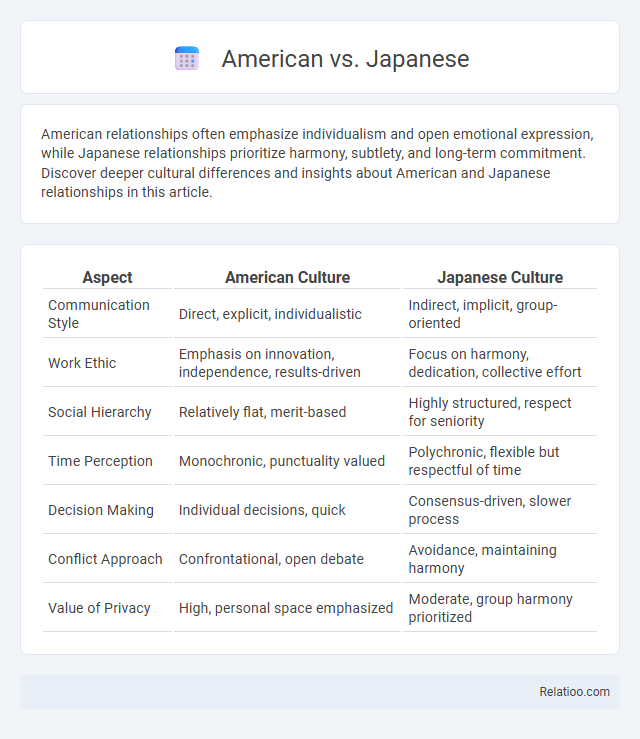American relationships often emphasize individualism and open emotional expression, while Japanese relationships prioritize harmony, subtlety, and long-term commitment. Discover deeper cultural differences and insights about American and Japanese relationships in this article.
Table of Comparison
| Aspect | American Culture | Japanese Culture |
|---|---|---|
| Communication Style | Direct, explicit, individualistic | Indirect, implicit, group-oriented |
| Work Ethic | Emphasis on innovation, independence, results-driven | Focus on harmony, dedication, collective effort |
| Social Hierarchy | Relatively flat, merit-based | Highly structured, respect for seniority |
| Time Perception | Monochronic, punctuality valued | Polychronic, flexible but respectful of time |
| Decision Making | Individual decisions, quick | Consensus-driven, slower process |
| Conflict Approach | Confrontational, open debate | Avoidance, maintaining harmony |
| Value of Privacy | High, personal space emphasized | Moderate, group harmony prioritized |
Historical Background of American and Japanese Cultures
American culture historically emphasizes individualism and personal freedom, promoting respect that often centers on personal achievement and equality. Japanese culture, rooted in Confucianism, stresses hierarchical relationships and collective harmony, with deep respect for elders as a cornerstone of social structure. Your understanding of these cultural nuances can enhance cross-cultural communication and appreciation.
Educational Systems: USA vs Japan
The American educational system promotes individualism and critical thinking, encouraging students to question and innovate, whereas the Japanese education system emphasizes group harmony, discipline, and respect for elders as integral to social cohesion. In Japan, respect for teachers and elders is deeply ingrained through rituals and hierarchical classroom structures, fostering a collective mindset among students. Your understanding of these cultural values can enhance cross-cultural communication and appreciation of differing approaches to elder respect in educational environments.
Work Ethic and Professional Life
American work ethic emphasizes individual achievement and innovation, promoting employees to take initiative and prioritize results. Japanese professional culture values group harmony, loyalty, and meticulous attention to detail, fostering long-term dedication and collective success. Your understanding of elder respect influences how work experience and seniority shape responsibilities and authority in each society's workplace.
Family Dynamics and Social Structure
American family dynamics emphasize individualism, where respect for elders is often shown through verbal acknowledgment and autonomy, reflecting a social structure that prioritizes personal freedom. Japanese culture deeply integrates elder respect through hierarchical family roles, daily rituals, and community expectations, reinforcing a collectivist social fabric built on harmony and duty. Your understanding of these cultural differences highlights how family dynamics and social structures shape varying approaches to honoring elders across societies.
Communication Styles and Language
American communication typically emphasizes directness and individual expression, using explicit language to convey respect through polite phrases like "please" and "thank you." Japanese communication relies heavily on indirectness, nonverbal cues, and honorific language (keigo) to show deference, reflecting a deep cultural value placed on hierarchy and social harmony. Elder respect in both cultures manifests through specific linguistic forms, with Americans often using titles and deferential tone, while Japanese use complex honorifics and humble language to maintain respect and social order.
Cuisine Culture: American vs Japanese Food
American cuisine often emphasizes individual choice and fast-paced dining, highlighting large portions and diverse flavors, while Japanese cuisine centers on harmony, presentation, and seasonal ingredients that reflect deep cultural respect for food and tradition. In Japanese culture, sharing meals fosters connection and reverence for elders through rituals like placing the eldest's dish first, contrasting with the typically informal, younger-focused dining customs in American settings. Your experience with food cultures can reveal how respect for elders shapes ingredient selection, meal structure, and social interactions at the table in these two culinary traditions.
Popular Entertainment and Media
American popular entertainment often portrays elder respect through themes of independence and personal choice, while Japanese media emphasizes deep filial piety and collective family honor, highlighting rituals and longstanding traditions. In contrast, Western narratives may depict elder care as a private matter, whereas Japanese anime and drama frequently explore multigenerational responsibilities as central to social harmony. Your understanding of elder respect can be enriched by analyzing these cultural nuances portrayed across movies, television, and literature.
Technology and Innovation Approaches
American culture emphasizes individual innovation and technological entrepreneurship, fostering rapid development and disruptive technologies through venture capital and startup culture. Japanese respect for elders integrates traditional values with meticulous, incremental innovation processes, prioritizing long-term quality and harmony in technology development. Elder respect in both societies influences innovation approaches by balancing progressive advancements with intergenerational knowledge transfer and ethical considerations.
Religion and Spiritual Beliefs
American respect often emphasizes individualism with respect grounded in personal achievements and equality, influenced by a diverse range of religious beliefs including Christianity. Japanese respect is deeply rooted in Shinto and Buddhist traditions, promoting harmony, hierarchy, and filial piety, where elders are revered as carriers of wisdom and spiritual guidance. Elder respect in both cultures reflects distinct spiritual frameworks: American views prioritize personal autonomy, while Japanese practices highlight communal responsibility and ancestral veneration.
Modern Lifestyle and Global Influence
American culture emphasizes individualism and equality, where respect for elders often focuses on personal achievement and mutual understanding in a modern lifestyle. Japanese society upholds deep-rooted traditions of filial piety and hierarchical respect, integrating these values into contemporary life while exerting significant global cultural influence. Your awareness of these differing approaches can enhance cross-cultural communication and appreciation in today's interconnected world.

Infographic: American vs Japanese
 relatioo.com
relatioo.com